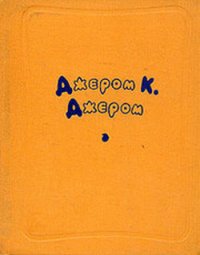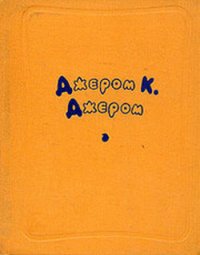My First Book - Jerome Jerome Klapka (полная версия книги txt) 📗
A word, first, as to my literary beginnings. I can scarcely remember the time when the idea of winning fame as an author had not occurred to me, and so I determined very early to adopt the literary profession, a determination which I unfortunately carried out, to my own life-long discomfort, and the annoyance of a large portion of the reading public. When a boy in Glasgow, I made the acquaintance of David Gray, who was fired with a similar ambition to fly incontinently to London—
The terrible City whose neglect is Death,
Whose smile is Fame!
and to take it by storm. It seemed so easy! 'Westminster Abbey,' wrote my friend to a correspondent; 'if I live, I shall be buried there—so help me God!' 'I mean, after Tennyson's death,' I myself wrote to Philip Hamerton, 'to be Poet Laureate!' From these samples of our callow speech, the modesty of our ambition may be inferred. Well, it all happened just as we planned, only otherwise! Through some blunder of arrangement we two started for London on the same day, but from different railway stations, and, until some weeks afterwards, one knew nothing of the other's exodus. I arrived at King's Cross Railway Station with the conventional half-crown in my pocket; literally and absolutely half-a-crown; I wandered about the Great City till I was weary, fell in with a Thief and Good Samaritan who sheltered me, starved and struggled with abundant happiness, and finally found myself located at 66 Stamford Street, Waterloo Bridge, in a top room, for which I paid, when I had the money, seven shillings a week. Here I lived royally, with Duke Humphrey, for many a day; and hither, one sad morning, I brought my poor friend Gray, whom I had discovered languishing somewhere in the Borough, and who was already death-struck through 'sleeping out' one night in Hyde Park [15]. 'Westminster Abbey—if I live, I shall be buried there!' Poor country singing-bird, the great Dismal Cage of the Dead was not for him, thank God! He lies under the open Heaven, close to the little river which he immortalised in song. After a brief sojourn in the 'dear old ghastly bankrupt garret at No. 66,' he fluttered home to die.
To that old garret, in these days, came living men of letters who were of large and important interest to us poor cheepers from the North: Richard Monckton Milnes, Laurence Oliphant, Sydney Dobell, among others, who took a kindly interest in my dying comrade. But afterwards, when I was left to fight the battle alone, the place was solitary. Ever reserved and independent, not to say 'dour' and opinionated, I made no friends, and cared for none. I had found a little work on the newspapers and magazines, just enough to keep body and soul alive, and while occupied with this I was busy on the literary twins to which I referred at the opening of this paper. What did my isolation matter, when I had all the gods of Greece for company, to say nothing of the fays and trolls of Scottish Fairyland? Pallas and Aphrodite haunted that old garret; out on Waterloo Bridge, night after night, I saw Selene and all her nymphs; and when my heart sank low, the fairies of Scotland sang me lullabies! It was a happy time. Sometimes, for a fortnight together, I never had a dinner—save, perhaps, on Sunday, when a good-natured Hebe would bring me covertly a slice from the landlord's joint. My favourite place of refreshment was the Caledonian Coffee House in Covent Garden. Here, for a few coppers, I could feast on coffee and muffins—muffins saturated with butter, and worthy of the gods! Then, issuing forth, full-fed, glowing, oleaginous, I would light my pipe, and wander out into the lighted streets.
Criticisms for the Athen?um, then edited by Hepworth Dixon, brought me ten-and-sixpence a column. I used to go to the old office in Wellington Street and have my contributions measured off on the current number with a foot-rule, by good old John Francis, the publisher. I wrote, too, for the Literary Gazette, where the pay was less princely—seven-and-sixpence a column, I think, but with all extracts deducted! The Gazette was then edited by John Morley, who came to the office daily with a big dog. 'I well remember the time when you, a boy, came to me, a boy, in Catherine Street,' wrote honest John to me years afterwards. But the neighbourhood of Covent Garden had greater wonders! Two or three times a week, walking, black bag in hand, from Charing Cross Station to the office of All the Year Round in Wellington Street, came the good, the only Dickens! From that good genie the poor straggler from Fairyland got solid help and sympathy. Few can realise now what Dickens was then to London. His humour filled its literature like broad sunlight; the Gospel of Plum-pudding warmed every poor devil in Bohemia.

At this time, I was (save the mark!) terribly in earnest, with a dogged determination to bow down to no graven literary idol, but to judge men of all ranks on their personal merits. I never had much reverence for gods of any sort; if the superior persons could not win me by love, I remained heretical. So it was a long time before I came close to any living souls, and all that time I was working away at my poems. Then, a little later, I used to go o' Sundays to the open house of Westland Marston, which was then a great haunt of literary Bohemians. Here I first met Dinah Muloch, the author of 'John Halifax,' who took a great fancy to me, used to carry me off to her little nest on Hampstead Heath, and lend me all her books. At Hampstead, too, I foregathered with Sydney Dobell, a strangely beautiful soul, with (what seemed to me then) very effeminate manners. Dobell's mouth was ever full of very pretty Latinity, for the most part Virgilian. He was fond of quoting, as an example of perfect expression, sound conveying absolute sense of the thing described, the doggrel lines—
Down the stairs the young missises ran
To have a look at Miss Kate's young man!
The sibilants in the first line, he thought, admirably suggested the idea of the young ladies slipping along the banisters and peeping into the hall!
But I had other friends, more helpful to me in preparing my first twin-offering to the Muses; the faces under the gas, the painted women on the bridge (how many a night have I walked up and down by their sides, and talked to them for hours together), the actors in the theatres, the ragged groups at the stage doors. London to me, then, was still Fairyland! Even in the Haymarket, with its babbles of nymph and satyr, there was wonderful life from midnight to dawn—deep sympathy with which told me that I was a born Pagan, and could never be really comfortable in any modern Temple of the Proprieties. On other points connected with that old life on the borders of Bohemia, I need not touch; it has all been so well done already by Murger, in the 'Vie de Boheme,' and it will not bear translation into contemporary English. There were cakes and ale, pipes and beer, and ginger was hot in the mouth too! Et ego fui in Bohemia! There were inky fellows and bouncing girls, then; now there are only fine ladies, and respectable, God-fearing men of letters.
It was while the twins were fashioning, that I went down in summer time to live at Chertsey on the Thames, chiefly in order to be near to one I had long admired, Thomas Love Peacock, the friend of Shelley and the author of 'Headlong Hall'—'Greekey Peekey,' as they called him, on account of his prodigious knowledge of things and books Hellenic. I soon grew to love the dear old man, and sat at his feet, like an obedient pupil, in his green old-fashioned garden at Lower Halliford. To him I first read some of my 'Undertones,' getting many a rap over the knuckles for my sacrilegious tampering with Divine Myths. What mercy could I expect from one who had never forgiven 'Johnny' Keats for his frightful perversion of the sacred mystery of Endymion and Selene? and who was horrified at the base 'modernism' of Shelley's 'Prometheus Unbound?' But to think of it! He had known Shelley, and all the rest of the demigods, and his speech was golden with memories of them all! Dear old Pagan, wonderful in his death as in his life. When, shortly before he died, his house caught fire, and the mild curate of the parish begged him to withdraw from the library of books he loved so well, he flatly refused to listen, and cried roundly, in a line of vehement blank verse, 'By the immortal gods, I will not stir!' [16]
15
See the writer's Life of David Gray.
16
I have given a detailed account of Peacock in my Look Round Literature.




